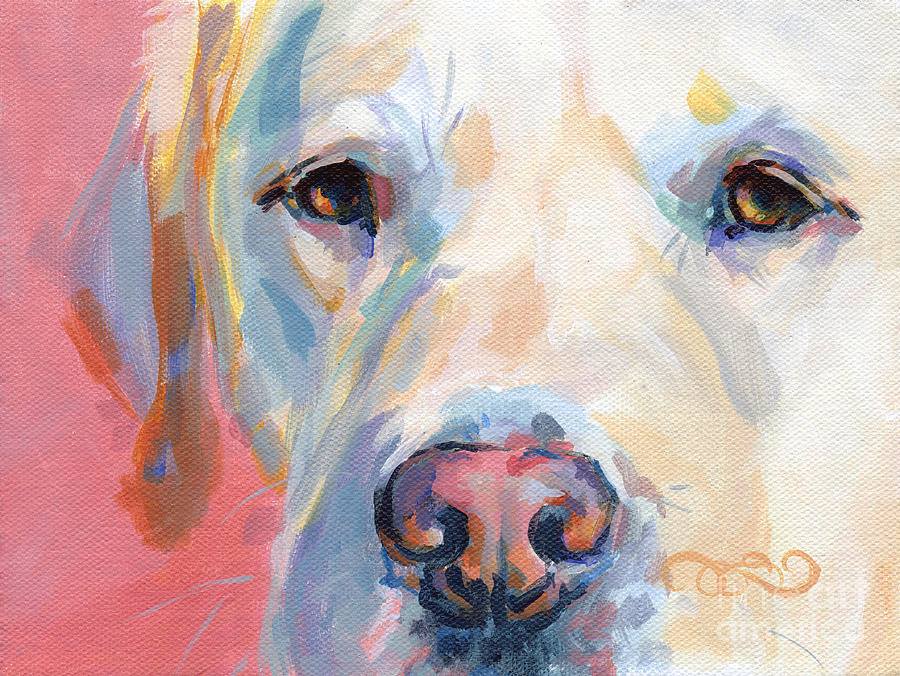
“Snow Nose.” Does your dog have it, or does he or she have what’s called a “Dudley nose?”
When a dog has a pink nose and its breed is supposed to have a black one, it’s called nasal depigmentation, or, more commonly, a “Dudley nose.” Typically, the dog is born with a solid black nose that gradually fades to a pale brown, pink, or, in the case of complete depigmentation, pinkish white. This should not be confused with “snow nose” (also called “winter nose”), a separate but common condition in which the dark pigment on a dog’s nose fades during the winter months and darkens again in spring and summer. With snow nose, complete depigmentation never occurs—the pigment may lighten, often just in the center, but a rim of darker pigment remains.
Genetically, the distinction is important, especially in breeds like the Labrador Retriever. Snow nose is most commonly seen in yellow Labradors that have black pigment (genotype eeBB or eeBb). During winter, a lack of sunlight can cause the black pigment to fade, resulting in a pinkish or lighter spot in the center of the nose, but the black pigment remains around the perimeter of the nose, on the eye rims, and flews. Some yellow Labs may lose pigment more permanently if their genetic makeup leads to weak black pigment, but strong black pigment is preferred by breeders.
A true Dudley, or what’s now more precisely called a “liver-pigmented yellow” Labrador (genotype eebb), lacks black pigment entirely. The shade of brown pigment on these dogs’ noses can range from light to dark, just as their coat color does. The AKC breed standard for Labradors is explicit: “A thoroughly pink nose or eye rims are a disqualification.” Some argue that a liver-pigmented yellow still technically has pigment, but because the standard requires black pigment for yellow Labs, any deviation—no matter how subtle—is considered a fault and can be grounds for disqualification in the show ring. In practice, though, liver-pigmented yellows are rarely shown, and judges seldom encounter them.
As for the term “Dudley nose,” it originated with bulldogs bred in the town of Dudley in the West Midlands of England—dogs that had pinkish, flesh-colored noses. The term eventually spread to describe similar pigment loss in other breeds. In Rawdon Lee’s 1894 book, “A History and Description of the Modern Dogs of Great Britain and Ireland (Non-sporting Division),” he describes dogs with “Dudley faces:” “Dogs that have flesh-coloured noses, with which light-coloured eyes and generally yellowish-looking countenances are often associated, are called ‘Dudley’ because such animals originally came from that part of the Black Country known as Dudley, which is in Worcestershire. Personally, where a dog is otherwise good, I would not disqualify him for his Dudley markings; but I must confess to being in the minority whilst holding such an opinion.”
So, the bottom line is that a snow nose is a temporary, seasonal fading of pigment, most often in yellow Labs with black pigment, and never results in a completely pink nose. A Dudley nose (or liver-pigmented yellow) is a genetic lack of black pigment, resulting in a permanently pink or flesh-colored nose and eye rims, and is a disqualification in the AKC Labrador standard.
If you’ve ever wondered where the term came from or why pigment matters so much in the show ring, now you know: it’s a blend of genetics, breed history, and a dash of old British dog lore.

Might I suggest an edit? You describe the nose as flesh colored. Flesh comes in many colors. Even Crayola no longer uses that word to describe a pinkish beige.
Sure, Sue. Got any ideas?
Oh good grief, talk about making a problem where there isn’t one. When flesh is cut into, it’s pinkish.
You’re confusing “skin color “
Don’t think so.